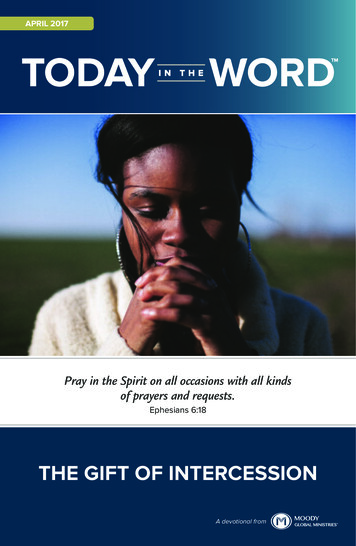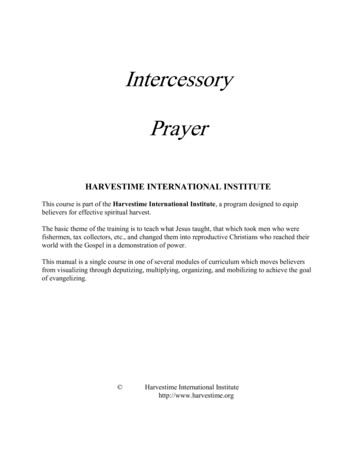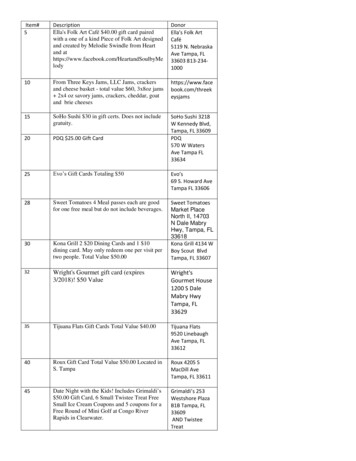
Transcription
APRIL 2017Pray in the Spirit on all occasions with all kindsof prayers and requests.Ephesians 6:18THE GIFT OF INTERCESSIONA devotional from
TODAY WITH DR. PAUL NYQUISTPresident of Moody Global MinistriesI’ll Pray for YouHow often haveyou responded toa friend’s troubleswith these words: “I’llpray for you”? I knowI have. Even thoughthis response mightseem overused, we should never forgetwhat a significant privilege it is to offerprayers to God on another’s behalf.powerful and necessary. At churches Ihave attended, I have seen intercessoryprayer in practice. During weekly prayermeetings, members gather to sharetheir needs and bring one another’srequests before God. Some churcheshave a prayer chain— one memberphones the next, asking God to providehealing or help for one of their own.Together, they pray for one another.Prayer is the most important thing wecan do for others. Oswald Chambers,the Scottish author best known for hisbook My Utmost for His Highest, oncesaid, “We tend to use prayer as a lastresort, but God wants it to be our firstline of defense. We pray when there’snothing else we can do, but God wantsus to pray before we do anything at all.”Some might think that praying on behalfof others should be done only by peoplewho seem most holy. But reservingthose prayers for the pastor or churchleaders is simply not scriptural. Againand again, the apostle Paul asks ordinarymen and women to pray on his behalf(see Rom. 15:30 and Col. 4:2–3).Of course, we also care for each otherin practical ways. We are called to “bearone another’s burdens, and therebyfulfill the law of Christ” (Gal. 6:2). In mostchurch families, people come togetherto help when someone faces a seriousillness, loss of a loved one, or financialhardship. I’ve watched church membersbring meals, care for young children,sit for hours with the bereaved, or evenshovel snow from a driveway.But intercessory prayer, anotherprivilege given to God’s children, is also(800) 356-6639James 5 urges us as well: “Is anyoneamong you suffering? Then he mustpray. Is anyone cheerful? He is to singpraises. Is anyone among you sick?Then he must call for the elders of thechurch and they are to pray over him(vv. 13–14). As James reminds us: “Theeffective prayer of a righteous man canaccomplish much” (v. 16).What a wonderful opportunity wehave to carry every burden, both forourselves and for others, before theLord in prayer! May we never neglectthis important task. n
THEOLOGY MATTERSby Dr. John KoesslerPrayer and the Attributes of GodThe believer’s confidence in prayeris grounded in two fundamentalattributes of God: His omnipotenceand His omniscience. The divineattribute of omnipotence describes Hispower, and the attribute of omnisciencedescribes His knowledge.Our hope in prayer is rooted in the factthat God is unlimited in His power. Hecan bring to pass anything He wills.God is the Creator who brought heavenand earth into existence by His word(Gen. 1:1–3). God’s omnipotence entailsHis sovereignty. He is ruler over all (Ps.103:19). His omnipotence means that allGod does must be consistent with Hisnature. For instance, God cannot lie orbreak His promises (Num. 23:19). He isnot the author of sin.Divine omniscience is a result ofGod’s perfect knowledge. He knowseverything before it comes to pass.He knows our thoughts, desires, andactions. The psalmist declares: “Before aword is on my tongue you, LORD, knowit completely” (Ps. 139:4). This perfectknowledge means that God understandswhat we need better than we do. Thisis why Jesus told His disciples not tobabble like pagans hoping to impressGod with the number of their words,“for your Father knows what you needbefore you ask him” (Matt. 6:8).This certainty should not make usless inclined to pray; indeed, justthe opposite. If God knows what weneed before we ask, then we can beconfident that He will take our requestsseriously. If He has a better sense ofwhat we need than we do, then weought to make our requests withoutreservation, confident that He will onlygrant those answers that are in ourbest interest.If He is omnipotent, we can pray inthe certainty that nothing that we askaccording to His will is beyond Hisability to grant. As John Newton’shymn about prayer says, “Thou artcoming to a King, large petitions withthee bring, for His grace and powerare such none can ever ask too much.”God’s omnipotence and omniscienceare not the only attributes that shapeour theology of prayer. We pray withan assurance of God’s righteousness,loving-kindness and goodness. Hewill never harm us or answer us withspite. His answers to our requestsalways have His glory and our goodas their intent. nFOR FURTHER STUDYTo learn more, read Letters toMalcolm: Chiefly on Prayer byC. S. Lewis (Mariner).TODAYINTHEWORD.COM
FROM THE EDITORSby Bruce EverhartThank You for PrayingOne of the regular features of Todayin the Word is the prayer requestaccompanying each day’s devotional.You may have wondered why we askyou to pray for our employees by name.Let me tell you about one sister in Christwhom you have encouraged with yourprayers. Eunice Childress works as astaff accountant in Moody’s Controller’sOffice. She commutes to Chicago eachday from her home in Indiana. “I enjoyworking at Moody because it providesa great opportunity to exercise myprofessional skills for the benefit ofGod’s kingdom,” she said. “Not everyonehas the opportunity to provide for theirfamily and serve the Lord in the sameplace, so I consider it a rare blessing.”prayed for me the day before whenreading Today in the Word. I was veryencouraged to hear that.Another evening, I was accompanyingmy husband, who is a pastor, in hishospital visits. I was so blessed whenone of the gentlemen we visited toldme, “You guys are coming to pray forme, but you know, I prayed for youtoday with Today in the Word!”Other employees have told me that inGod’s perfect timing, their name wasfeatured on a day when they especiallyneeded prayer support. You’re ourprayer warriors, and we are thankful foryour role in this ministry.Eunice prays with her departmentseveral times throughout the week, andshe appreciates the prayers of Todayin the Word readers on her behalf. Shehas specific examples of the blessingsof your prayers.As devoted readers of God’s Word,you know we are called to be men andwomen of prayer. What a privilege toencourage one another to faithfullycomplete the tasks set before us, to“build each other up, just as in fact youare doing” (1 Thess. 5:11).A few years ago, one of my daughter’sschool friends was home. When hermom came to pick her up I came toanswer the door. We didn’t know eachother very well then, so she askedme, “Do you work at Moody?” WhenI replied yes, she told me she hadYou play an integral role in what God isdoing through Moody. As believers, weare one body, united in purpose, workingtoward a common goal. Thank you fromall of us at Moody, and may God blessyou and your loved ones this Easter aswe celebrate our Risen Lord! n(800) 356-6639
VOLUME 30 ISSUE 4EXECUTIVE EDITORBruce EverhartMANAGING EDITORHeather MoffittSENIOR EDITORElena MafterCONTRIBUTING EDITORSJamie JanoszJohn KoesslerWRITERMegan HillART DIRECTORLynn GabalecGRAPHIC DESIGNERSLarry Bohlin, Dana ChenBUSINESS MANAGERPaul B. CurrieMARKETING MANAGERClaire KniowskiMOODY GLOBAL MINISTRIESPRESIDENTJ. Paul NyquistPROVOSTJunias VenugopalEXECUTIVE VICE PRESIDENTSteven MogckSENIOR VICE PRESIDENTGreg R. ThorntonCHIEF FINANCIAL OFFICERKen HeulittVICE PRESIDENTSTim ArensLarry DavidhizarJim ElliottBruce EverhartJohn A. JelinekCollin G. LambertFrank W. Leber Jr.Bryan O’NealPaul SanthouseJames SpencerJanet StivenAnthony TurnerDebbie ZelinskiTRUSTEESChristopher DenisonOrbelina EguizabalT. Randall Fairfax (Chairman)Thomas S. FortsonManuel GutierrezJerry B. JenkinsPaul Johnson (Emeritus)James MeeksJ. Paul NyquistDavid SchipperJulianna SlatteryPaul Von TobelMark WagnerRichard E. WarrenRichard YookThe Gift of IntercessionMany kids in the 1980s and 1990s delighted in the“Choose Your Own Adventure” children’s book series.Based on the original idea of American author EdwardPackard, readers make choices that determine theplot’s twists and turns. The books involved the readersin the development of the story, enlarging theirimagination and sense of adventure.Intercessory prayer is a lifelong adventure for everyChristian. We can’t know the outcome, but we haveto make a decision to pray. In his book Prayer, pastorTimothy Keller writes: “Prayer is simply the key toeverything we need to do and be in life. We must learnto pray. We have to.” This month’s study in Today in theWord will help us learn about prayer and intercession.We’ll learn what the Bible says about prayer for eachother, for our families, and for the unbelievers. We’ll lookat examples of intercessory prayers—for forgiveness,healing, revival, and missions—as well as what Jesussaid when He taught His disciples how to pray.We hope you will be encouraged by this month’s studyand continue to walk faithfully with our living Lord,seeing the answers to your prayers. Thank you forpraying each day for various Moody’s departmentsand ministries in the “Pray with Us” column in eachissue. And your financial support of the ministry ofToday in the Word is the Lord’s answer to our prayerfor provision. We praise God for our readers! nMoody Global Ministries is the sole publisher of Today in the Word, copyright 2017 by Moody Global Ministries. All rights reserved. Please direct all Todayin the Word inquiries to Donor Resource Management, 820 N. LaSalle Blvd.,Chicago, IL 60610. Scripture taken from the Holy Bible, New International Version ,NIV , copyright 1973, 1978, 1984, 2011 by Biblica, Inc. Used by permission.All rights reserved worldwide. Scripture taken from the New American StandardBible , copyright 1960, 1962, 1963, 1968, 1971, 1972, 1973, 1975, 1977, 1995 bythe Lockman Foundation. Used by permission. Printed in the U.S.A. Today in theWord is published monthly. Printed on 30% recycled paper.TODAYINTHEWORD.COM
READ ACTS 1:1–14SATURDAYAPRIL1Let all the people say, “Amen!” Praise the LORD.Psalm 106:48Praying Together Is NormalIn his book Life Together, DietrichBonhoeffer wrote, “It is in fact the mostnormal thing in the common Christianlife to pray together.” A circle of peoplewith their eyes closed and heads bowedmight seem strange to a non-Christian,but it should be normal for believers.Following Christ’s death, resurrection,and ascension, members of the earlychurch prayed together. Jesus hadgone away—at least physically. As theyobeyed His command to remain inJerusalem, the first followers of Christfound themselves drawn togetherfor strength and comfort. When theygathered in one place for prayer, theycould continue to experience thenearness of Christ’s presence (see Matt.18:20) and could encourage one anotherwith their shared petitions and praises.They had much to pray about. Jesushad given them a task: “You will be my6witnesses” (v. 8). He had also given thema promise: “You will be baptized with theHoly Spirit” (v. 5). Their prayer meetingsin the Upper Room were both an act ofdependence on the God who uses frailpeople to accomplish His work in theworld and an act of faith that He wouldkeep His promise and send His Spirit.Not only was praying together a normalpart of the early church’s shared life,it was normal for all kinds of people inthat church. Each one of the remainingeleven disciples was present, and “theyall joined together” in prayer, includingwomen as well as Jesus’ mother andbrothers (v. 14). Intercession is anactivity for everyone—no matter ourage, gender, ability, or spiritual maturity.As we will see more fully later in thisstudy, every person who belongs toChrist can contribute to the work ofpraying together. Let us pray.APPLY THE WORDPRAY WITH USWe have many good reasons to pray with othersas a normal part of our Christian life. We tooare called to be Christ’s witnesses in the world,and we too need the help of His Holy Spirit toaccomplish our task. As we study intercession andcorporate prayer this month, commit to putting thisgift of praying together into practice.Please pray for our PlannedGiving team in the Stewardshipdepartment: Crystal DavisLandrum, Eric Beckman, Lysa Ellis,and Stephen Kott. Ask God toguide them as they oversee thegenerous donations and fundsgiven by friends of Moody.TODAY IN THE WORD
READ HEBREWS 10:1–25This, then, is how you should pray: “Our Father, inheaven, hallowed be your name.”Matthew 6:9SUNDAYAPRIL2We Talk to GodWhen she was a teenager, Rifqa Barycame to Christ out of Islam. In hertestimony, Hiding in the Light, sherecounts how she was first attractedto Christianity when she witnesseda prayer meeting at a friend’s house.Coming from the cold and regimentedprayers of her Muslim home, she wasastonished by how intimately theseChristians prayed, as if they were simplytalking to God.This is the great delight of Christianprayer: calling on God our Father as anexpression of our relationship. But aswe see in today’s passage, the problemof our sin must be addressed beforewe can approach a holy God (v. 1). Todemonstrate the immense burden ofsin, the writer of Hebrews describes thegreat cost and effort required for theOld Testament sacrifices. The blood ofanimals, which was offered by humanpriests, was designed to point God’speople toward the better sacrifice thatwas to come (vv. 9–11).Jesus is both the ultimate sacrificeand the ultimate priest. His once-forall sacrifice is better than the ongoingpresentation of the blood of animals.His perfect obedience, death, andresurrection makes us holy and securesour relationship with the Father. Hissacrifice is so complete that the writertells us “he sat down” (v. 12), notneeding to do anything more in orderto bring us to God.Through the blood of Jesus, our prayerscan be confident, sincere, full of faith,free from guilt, unswervingly hopeful,and encouraging to those around us(vv. 19–25). If we trust in Christ, we arefree to call out to God in prayer withall the eagerness of children calling toa parent, fully assured that we will beheard with love.APPLY THE WORDPRAY WITH USPrayer is not like a birthday wish or a magicabracadabra. It is our confident communicationwith God in the context of a mutually lovingrelationship. Our Savior Jesus Christ died sothat we can pray to the Father with “a sincereheart” and “full assurance” (v. 22). Pray with thisassurance today!We thank God for all the hope,comfort, and joy Moody Radio’sministry brings to its listeners, andwe lift in prayer Collin Lambert,vice president of Moody Radio.We pray today that the Lord wouldgive him encouragement in hisday-to-day responsibilities.MOODY GLOBAL MINISTRIES7
READ ROMANS 8:14–34MONDAYAPRIL3Christ Jesus who died—more than that, who wasraised to life—is at the right hand of God and isalso interceding for us.Romans 8:34Father, Son, and Spirit—and UsIn 1918, Eric Enstrom took a photographhe called Grace, and the iconic print hashung in countless Christian homes andchurches ever since. In this image, anelderly man with clasped hands bowshis head in prayer over a simple mealof gruel and bread. As far as viewer cansee, the man is completely alone.We often think of prayer as a solitaryactivity done behind closed doors or,as in Grace, by ourselves at the table.But our text reminds us that even whenwe appear to be praying alone, we areactually joined by the triune God. Thefirst participant in a believer’s prayers isthe Father, who hears His child’s criesof “Abba!” The Father’s hearing is notpassive; it is His active inclination toaccept requests and respond by doingwhat is best. The loving Father has thepower to accomplish all things for Hischildren’s good.8Next, the Son brings the prayers to theFather as mediator and intercessor. Wesaw yesterday that Christ secures ourright to pray. We see today that Christalso prays for His people (v. 34). Just asHe prayed for Job in the midst of trials(Job 16:20–21), just as He prayed forPeter before Satan’s temptation (Luke22:31–32), and just as He prayed forHis disciples before they became Hiswitnesses (John 17), Jesus prays for allbelievers, bringing their concerns to thelistening Father.Finally, the Spirit helps us when we prayby fixing our imperfect prayers and bypraying for what is best. The Spirit is thedivine prayer partner who “intercedesfor us through wordless groans” (v. 26)when we don’t know how to pray. TheFather hears, the Spirit helps, and theSon intercedes, making our prayers partof a glorious, heavenly conversation!APPLY THE WORDPRAY WITH USA praying believer is never alone with his thoughtsat the table but is joining a divine conversationalready in progress. It is perfectly correct to saythat when we pray, each person of the Trinity isinvolved in our prayer. The knowledge that Godthe Father, Son, and Spirit are actively participatinggives us both confidence and eagerness to pray.Please pray for Radio Moody, ourSpanish station, and its team:Elsa Mazón, Gerson García, andYahir Vergara. We ask that theHoly Spirit blesses their efforts asthey bring biblical programmingto Spanish speakers in the UnitedStates and beyond.TODAY IN THE WORD
READ EPHESIANS 4:1–16When they heard this, they raised their voicestogether in prayer to God.Acts 4:24TUESDAYAPRIL4All of Us Talk to Our GodA recent research brief from theInstitute for Family Studies reports thatpraying with a spouse is “a strongerpredictor of relationship quality thanother religious factors in our statisticalmodels. It is also a better predictorof relationship quality than race,education, age, sex, or region.”Christians don’t base discipleship onstatistics, of course, but it is no surprisethat God’s good gift of praying togetherbrings reports of happiness. Not onlyin families but also in churches andamong friends, praying together is anexpression of the closeness believershave in Christ. As the old Sundayschool song goes: “He is the vine, andwe are the branches.” Today’s passagedescribes the church as a body thatgrows, matures, and uses every partas it does its work, an image whichhighlights the essential connectednessof fellow Christians through their sharedrelationship to Christ.In verses 4 through 6, Paul repeatedlyuses the word one to reinforce just howmuch Christians have in common. Weare part of one body and indwelt byone Spirit, and we also have one unifiedhope that gives rise to one professionof faith.Our relationship to one another is alsoa matter for intentional effort. In verse 3,Paul exhorts his readers to “make everyeffort to keep the unity of the Spirit inthe bond of peace.” The believers inEphesus met for worship, served oneanother, encouraged one another,exhorted one another, and prayed withand for one another as an expressionof their relationship and as a means ofstrengthening those bonds. Prayers ofintercession, in particular, allowed theearly church to unite their hearts evenas they united their voices, allowingthem to bear one another’s burdens tothe One who cares for all of His people.APPLY THE WORDPRAY WITH USNineteenth-century churches often called theirmidweek prayer meeting “the social meeting.” Thisis appropriate when we consider that the churchis a society under Christ and that intercession isone of its most important and blessed practices.As we organize social events for our churches andcommunities, we ought to include times of prayer.Lift in prayer Joel Wright andMark Williames, Moody Radio’sEngineering Services staff. Wethank God for their dedication andhard work to provide our listenerswith quality broadcasts. PraiseGod for Moody Radio’s dailyoutreach to thousands!MOODY GLOBAL MINISTRIES9
READ GENESIS 4WEDNESDAYAPRIL5Go to the house of Judas on Straight Street and askfor a man from Tarsus named Saul,for he is praying.Acts 9:11The First Prayer MeetingIn September 1646, Massachusetts Baycolonist and minister John Eliot firsttraveled to an Algonquin settlementto preach the gospel. That gatheringbecame the first of many and wouldresult in the conversion of hundreds ofpeople. Year after year, Algonquin men,women, and children left debaucheryand sorcery in order to worship God.Those settlements of new Christianscame to be known as “Praying Towns.”Cain’s line was marked by exponentiallyincreasing wickedness. Today’spassage particularly notes Lamech,an arrogant man who bragged abouthis short temper and violent habits (vv.23–24). The members of Cain’s familywere undoubtedly gifted: they raisedlivestock, played musical instruments,and forged useful metal tools. But theattitude of their hearts was rebellionagainst the God who had created them.Throughout the Bible, prayer—especially corporate prayer—is thedistinguishing mark of God’s people.We see this first in Genesis 4, theoriginal family tree. After their fall intosin, Adam and Eve were shut out of thegarden home where God had originallyplaced them. But God continued tobe gracious toward them despite theirrebellion, and He gave them children.These descendants, the family of Cainand the family of Seth, became the twovery different lines of humanity.Seth, God’s gift to Eve after Abel’s death,fathered a line of godly descendants.In contrast to the description of theCainites, Genesis does not give manydetails about the family of Seth. It doesrecord that they were praying people.To “call on the name of the Lord”(v. 26) means to call on Yahweh—therelational, covenant-making God—toaccomplish His purposes in the world.By this practice the children of Sethdistinguished themselves from thewickedness around them.APPLY THE WORDPRAY WITH USLike the family of Seth, we are surrounded by aculture that is filled with brilliant, talented peoplewho continually reject the Lord. And like the familyof Seth, we too can call on the name of the Lord.Take time this week to join with your spiritualfamily members to pray for God’s mercy andblessing, helping you to stand for Him.Will you remember Moody’s chieffinancial officer Ken Heulitt inprayer today? We are grateful toour Lord for Ken’s financial adviceand expertise, and we pray Godguides him to best utilize ourfunds for His glory.10 TODAY IN THE WORD
READ 2 CHRONICLES 6:14–42THURSDAYMy house will be called a house ofprayer for all nations.APRILIsaiah 56:76God’s House of PrayerMost organizations have a statementthat declares their goals and explainshow these goals will be accomplished.The mission statement is usually madepublic to inform and guide anyone whointeracts with the organization.In today’s passage, Solomon’s prayeris a kind of mission statement for thenewly built temple. He marvels at aGod who would make a way to dwellwith humanity in fellowship, and herecognizes that God’s people cancome to Him only through humblesupplication. Here, Solomon envisionsseven situations in which people willcome to the temple. In this list, hedescribes the feuding neighbors, thedefeated army, the drought-plaguedfarmers, the afflicted citizens, and thedespairing captives. Caught in a varietyof troubles, these people pray.Perhaps most surprisingly Solomonincludes “the foreigner who does notbelong to your people Israel” (v. 32)among those who stand in the templecourts and bring their requests to God.Right in the middle of his repeatedsupplications to God on behalf of“your people,” he asks God to hearthe prayers of those who are not Hispeople. The temple, built in Israel byIsrael for Israel, is not Israel’s alone.Any person—or all people together—can pray there.Unlike a mission statement, Solomon’sprayer is not simply aspirational butis based on the sure and certaincovenant promises of God. His prayerforeshadows the vision of Isaiah and,later still, of Jesus. The promised futureof God’s people includes every nationand people group coming together topray. As commentator Edward Youngwrites: “Here is the beauty of holiness;men from all nations, brought to Hishousehold by sovereign grace, lift up thesacrifice of prayer unto His holy name.”APPLY THE WORDPRAY WITH USSolomon set prayer as a clear priority for God’speople, and Isaiah and Jesus both called the temple“a house of prayer” (see Isa. 56:7; Matt. 21:3). Wouldyou describe your church that way? What aboutyour home? Why or why not? What are some waysyou could seek to make interceding for and withothers part of the mission statement for your life?Continue to pray for Moody’sfinancial staff today by upholdingthe Office of the Treasurer inprayer: Eleanor Ehresman, AbigailVega, Holly Motta, and JulieVinlasaca. Praise God for theirwise stewardship of our finances.MOODY GLOBAL MINISTRIES 11
READ DANIEL 2:1–23FRIDAYAPRIL7May the favor of the Lord our God rest on us.Psalm 90:17Praying Together in ExileChristians love to tell and retell storiesabout prayer in hard times: Corrie tenBoom praying in the Nazi concentrationcamp, Darlene Deibler Rose praying in aJapanese prison camp, Amy Carmichaelpraying in the spiritual darkness ofIndia. These favorite narratives remindus that God faithfully hears and answersthe desperate cries of His children.Today’s passage is another such story,this time from the inspired Word ofGod. In it, Daniel and his three friendsfind themselves in a perilous situation.Separated from their godly families,renamed, educated in pagan culture,and listed on the king’s roster ofsorcerers and magicians, these fourwere continually in danger of beingabsorbed into the godless practicesof Babylon (see Daniel 1). But whenDaniel was asked by the king tointerpret a dream he hadn’t even heard,his immediate response was clearlycountercultural: he organized a prayermeeting. While the king’s so-called wisemen demonstrated their ignorance, theJewish teenagers sought the help ofthe only wise God.Perhaps even more remarkable thanthe teens’ inclination to pray togetherfor help is their immediate responseof thanksgiving when God answeredthem (vv. 19–23). The impatient kingwas waiting and the life of every wiseman—including Daniel—was under adeath sentence, but the four youngmen chose to deal with the most urgentmatter first: they prayed together. Asstrangers in a strange land, they hadneither parents nor priests to remindthem to develop godly habits, but theirsincere faith drew them to communionwith their God.God’s people in exile always findthemselves on their knees. This practicesets them apart from the world anddraws them near to the God who hears.APPLY THE WORDPRAY WITH USWhile we might know that our first response todifficulties ought to be prayer, in practice we oftendo everything else instead. While we know thatwe ought to receive the Lord’s answers to ourprayers with thanksgiving, we sometimes forget.Ask the Lord to help you make intercession andthanksgiving your first response to every situation.Your prayers today will be anencouragement to Frank Leber,vice president of InformationTechnology Services. Pray thatthe Lord guides him to leadhis team well, that they mayaddress computer issuesefficiently and accurately.12 TODAY IN THE WORD
READ MATTHEW 6:1–15For where two or three gather in my name, theream I with them.Matthew 18:20SATURDAYAPRIL8Jesus Teaches His Disciples to PrayOn November 19, 1863, PresidentAbraham Lincoln delivered one of themost famous presidential speechesin the history of the United States. His“Gettysburg Address” was only 272words long—just ten sentences, but itdefined the country’s purpose and setits priorities for generations.Our study now brings us to the NewTestament, and in today’s familiarpassage Jesus establishes a focus andframework for His disciples’ prayers.First, He cautions them against pride.Prayer is an acknowledgment ofdependence on God, and pride—inpublic displays of piety (v. 5) or in fancy,fluent language (v. 7)—has no place intrue supplication. Instead, the one whocomes to God can bring only what theEnglish Puritan Thomas Manton called“the empty hand of faith.”Jesus’ exemplary prayer, surprisinglybrief, shows His disciples what toask. He sets the primary concerns ofGod’s glory and the fulfillment of Hissaving purposes at the forefront. Then,He reminds the disciples what theyneed: material provision, forgiveness,and deliverance from sin. And Jesusshows them how to ask, demonstratingby His words a sincere and humbledependence on God for both kingdomconcerns and daily needs.He also tells them with whom theyshould ask. Jesus’ disciples werefamiliar with praying together; severaltimes during His earthly ministry, Jesustook His disciples with Him to theplace of prayer and asked them to prayalongside Him. So it is not surprisingthat the language of the Lord’s Prayeris consistently corporate. From “OurFather” to “deliver us from the evil one,”Jesus taught His disciples not just topray in private (v. 6) but also to pray withother believers, asking their commonFather for their common needs.APPLY THE WORDPRAY WITH USWe are not left to figure out prayer on our own.God has graciously given us an example of thekind of prayer that He is pleased to hear. What’smore, He encourages us to join in prayer withother people who share the same needs andconcerns. Ask the Lord to show you someone withwhom you could come to Him in prayer.Please include the ITS SupportCenter in your prayers today. MayGod honor the dedication of ErubeyBautista, Jason Floyd, RebekahCampbell, Stephen McElhiney, andWilliam Eyerdom, allowing themto solve Moody’s computer issueswith speed and competency.MOODY GLOBAL MINISTRIES 13
READ EPHESIANS 6:10–20SUNDAYAPRIL9The children [were] shouting in the temple courts,“Hosanna to the Son of David.”Matthew 21:15Our Spiritual Weapon for Spiritual VictoryOn the first Palm Sunday in Jerusalem,crowds of people gathered shoutingHosannas for Jesus the Messiah. Butnot everyone was jubilant. As our keyverse today notes, the chief priests andteachers of the law reacted to the criesof even little children with resentmentand anger. They knew public praise hadgreat power, and they quickly tried tostop it.Today’s passage places prayer amongthe spiritual weapons that God gives
But intercessory prayer, another privilege given to God’s children, is also powerful and necessary. At churches I have attended, I have seen intercessory prayer in practice. During weekly prayer meetings, members gather to share their needs and bring one another’s requests before God. Some










